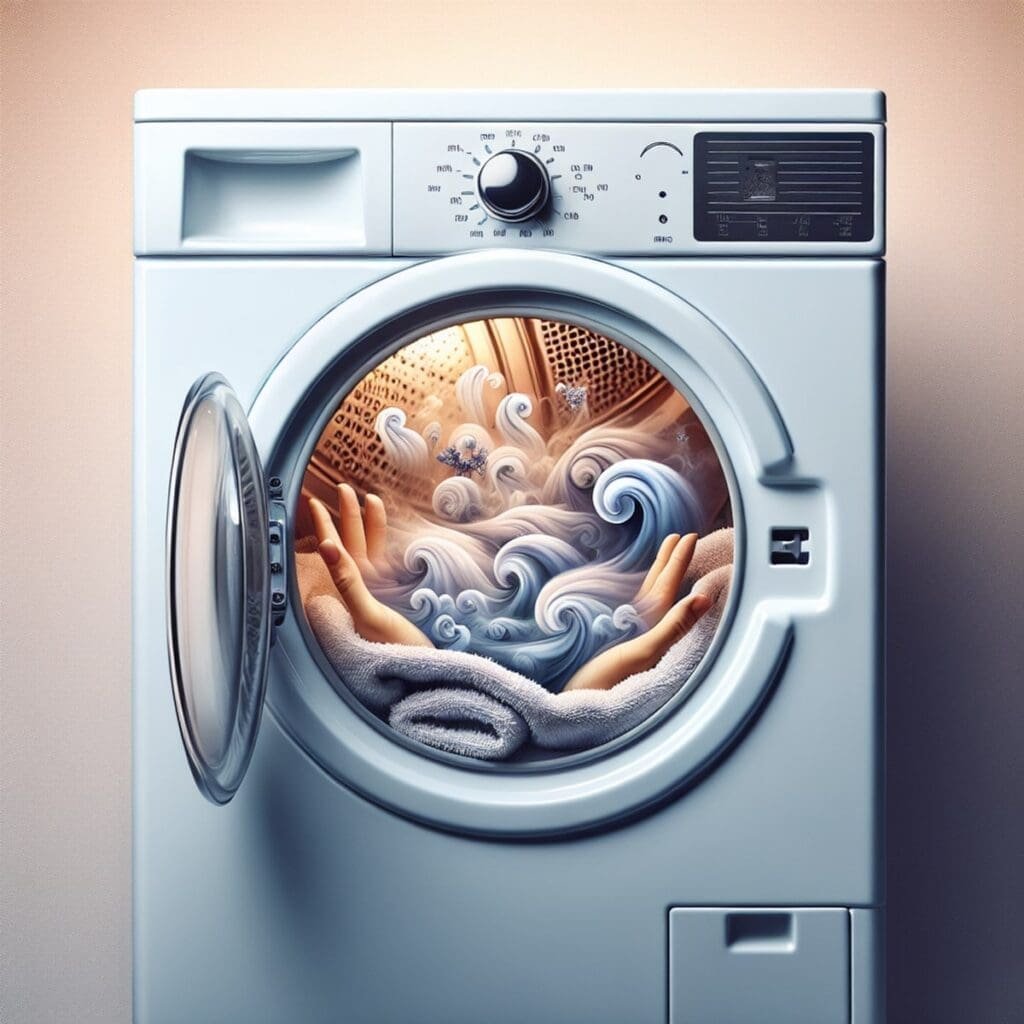
Introduction : Do Your Clothes Smell Bad After The Dryer?
Do your clothes sometimes come out of the dryer with a musty smell, even though you just washed them? It can be really frustrating when you’ve put in the time and effort to do your laundry, only to have it come out smelling unpleasant. Clothes Smell Sour After Drying
In this article, we’re going to talk about why this happens and what you can do to fix it. We know how important it is to have fresh-smelling clothes – not just for your own comfort, but also for your confidence in wearing them. So let’s dive into the causes of these bad smells and find out how to get rid of them.
Throughout this article, we’ll cover a few different things:
- The main reasons why your clothes might smell bad after drying.
- The role that moisture plays in causing mold and odors.
- Other possible causes, like leaving wet clothes sitting around too long.
- Tips and tricks to help you make sure your laundry smells great from start to finish.
If you’ve ever wondered why your clothes don’t smell fresh after drying or have been searching for solutions online, you’re in the right place. We’ve gathered some practical advice and effective tips to help you get rid of those unwanted odors. Let’s start our journey towards odor-free laundry!
Understanding the Causes of Bad Smells in Laundry

When it comes to doing laundry, there’s nothing quite as frustrating as pulling out your clothes from the dryer only to discover that they have a sour smell. But what causes this unpleasant odor? Let’s explore some of the common culprits:
1. Mold and Mildew
Mold and mildew are often the main causes of persistent odors on dried laundry. These fungi thrive in damp environments, and if your clothes are not thoroughly dried, they can become a breeding ground for mold and mildew. The presence of mold and mildew can result in musty odors that seem impossible to get rid of.
2. Excessive Moisture
Excessive moisture plays a significant role in facilitating mold growth and subsequent smell issues. If your dryer isn’t properly vented or your clothes are not fully dried, moisture can get trapped in the fabric, creating an ideal environment for mold and mildew to develop.
3. Leaving Wet Clothes Stagnant
Another possible cause of bad-smelling laundry is leaving wet clothes stagnant for too long. When wet clothes sit around, especially in warm or humid conditions, they can develop a musty odor. This is particularly common if you forget about a load of laundry or leave it sitting in the washing machine for an extended period before transferring it to the dryer.
To prevent these odor issues, it’s important to address the root causes. In the following sections, we’ll discuss various solutions and strategies to tackle mold and mildew problems, avoid common mistakes that lead to foul odors, troubleshoot lingering smells, explore alternative drying methods, and make your laundry smell better throughout the washing process. By understanding the causes and implementing effective solutions, you can ensure that your freshly laundered clothes always smell clean and fresh.
1. Mold and Mildew: The Culprits Behind Your Stinky Clothes
When it comes to getting rid of those stubborn smells on your dried laundry, regular maintenance tasks are key in preventing mold and mildew problems in both your dryer and washing machine. If you ignore these tasks, you may end up with unpleasant odors that just won’t go away from your clothes. One important maintenance task is cleaning the lint trap in your dryer. This step is crucial for removing trapped moisture, which can become a perfect environment for mold and mildew to grow.
Cleaning the Lint Trap
To prevent mold and mildew from causing foul odors on your clothes, it’s important to be proactive in maintaining your appliances:
- Check and clean the lint trap after each load of laundry: This simple action helps to remove lint, fibers, and other debris that can accumulate in the trap. These materials can hold onto moisture, creating an ideal breeding ground for mold and mildew.
- Clear any lint buildup around the trap: Sometimes, lint can also accumulate around the area where the lint trap is located. Make sure to clean this area as well to prevent moisture retention and potential mold growth.
Mold Issues in Washing Machines
Aside from dryers, mold can also be a problem in washing machines. Over time, moisture can build up in various parts of the machine, leading to the growth of mold and mildew. To tackle this issue:
- Use a washing machine cleaner: Consider using a specialized cleaner designed to eliminate mold and mildew from your washing machine. These cleaners often contain ingredients that can effectively remove existing mold while also preventing future growth.
By being proactive about regular maintenance and cleaning tasks like these, you can effectively deal with mold and mildew problems, ensuring that your clothes always come out of the dryer smelling fresh and clean.
2. Avoiding Common Mistakes that Lead to Foul Odors
Certain laundry practices can inadvertently contribute to bad-smelling results after drying. To avoid these issues and maintain fresh-smelling clothes, consider the following tips:
- Proper load sizes: Overloading the washing machine with too many clothes can prevent them from getting properly cleaned and rinsed. This can lead to trapped dirt and bacteria, resulting in unpleasant odors. To ensure thorough cleaning and prevent foul smells, follow the manufacturer’s guidelines for load capacity.
- Water levels: Using too little water during the wash cycle can also contribute to bad smells. Insufficient water may not effectively dilute detergent or rinse away dirt and grime, leaving residues on the clothes. Be sure to select the appropriate water level setting based on your load size and follow the recommended detergent dosage.
- Separating garments effectively: Mixing elastic items, such as bras or socks with Velcro closures, with other clothes can cause fabric pilling, snags, and odors. The friction between different types of fabrics can create a breeding ground for bacteria and mold. Separate these items from the rest of your laundry to prevent unpleasant smells.
Remember, proper laundry practices go beyond just drying your clothes. By avoiding common mistakes like overloading the washing machine, using too little water, and mixing incompatible garments, you can reduce the chances of foul odors in your laundry.
Dealing with Specific Types of Odor Problems in Dried Laundry
When it comes to dealing with specific types of odor problems in dried laundry, it’s important to understand the distinct nature of chemical odors and their origins in the drying process. Here are some strategies for addressing these specialized smell issues:
1. Off-Gassing in New Dryers
If you’ve recently purchased a new dryer, you may notice a chemical odor on your clothes. This is known as off-gassing and occurs when volatile organic compounds (VOCs) are released from the materials used in manufacturing the appliance. To address this issue, try the following:
- Ventilate the dryer: Before using your new dryer, open windows or doors to allow fresh air to circulate in the laundry area. This will help dissipate any lingering chemical odors.
- Run empty cycles: Prior to drying your actual clothes, run a few empty cycles with low heat to help burn off any residual chemicals.
2. Burning Elastic in Clothes
If you’ve accidentally left clothing items with elastic bands in the dryer for too long or set the heat too high, you may notice a burnt smell on your clothes. To tackle this problem:
- Remove affected items: Take out any clothes that have a strong burnt odor immediately.
- Air them out: Hang the affected clothes outside or near an open window for fresh air to help eliminate the smell.
- Rewash if necessary: If the smell persists, consider rewashing the garments with an odor-eliminating laundry detergent.
Remember, prevention is key when it comes to dealing with specific types of odor problems. Be mindful of what you put in the dryer and how you set its settings. By following these strategies, you can effectively address chemical odors and burning elastic issues in your dried laundry.
Troubleshooting Tips for Lingering Smells in Laundry After Drying
When dealing with persistent odors in laundry after drying, it’s important to find out what’s causing them and take specific actions to get rid of them. Here are some tips to help you solve the problem:
1. Check for Mold and Mildew:
Inspect both the washing machine and dryer for any signs of mold or mildew. Clean the rubber gasket, drum, and detergent dispensers in the washer. In the dryer, thoroughly clean the lint trap and exhaust vent to eliminate trapped moisture.
2. Evaluate Drying Time:
Make sure your clothes are completely dry before taking them out of the dryer. If they’re still slightly damp, they might develop a musty smell over time.
3. Use Proper Detergents:
Choose detergents that are specifically made to remove odors, especially if you often have this problem. Look for products that say they can get rid of bacteria and mold spores.
4. Adjust Wash Settings:
Pick higher spin speeds when you’re washing your clothes to get more water out of them before drying. This can help prevent too much moisture from building up in the dryer, which can lead to odors.
5. Try Different Dryer Sheets:
Use scented dryer sheets or wool dryer balls with different fragrances to give your laundry a fresh smell.
By looking into these possible causes and trying out these tips, you can effectively deal with lingering smells in your laundry after drying.
Exploring Alternative Drying Methods
When it comes to drying your laundry, you have a few options to consider. Let’s take a look at the pros and cons of different air-drying techniques in relation to achieving fresh-smelling results:
Tumble Dry
Using a dryer is convenient and can save time, but it may not always result in the freshest smell for your clothes. The heat and lack of ventilation in the dryer can sometimes contribute to a musty stale smell, especially if the laundry is not completely dry when removed.
Line Dry
Line drying offers numerous benefits for achieving fresh-smelling laundry:
- The exposure to fresh air and sunlight can help eliminate odors naturally.
- Additionally, line drying reduces the need for artificial fragrances and fabric softeners, contributing to a more natural scent.
Outdoor Line Drying
While outdoor line drying can be effective for achieving fresh-smelling results, there are potential issues to consider:
- Clothes left outside for an extended period may absorb outdoor odors.
- They may also be exposed to environmental factors like pollen or dust, affecting their scent.
Exploring alternative drying methods provides insight into the various ways you can achieve fresh-smelling laundry. Whether you opt for the convenience of tumble drying or the natural benefits of line drying, understanding the pros and cons of each method can help you make an informed decision for your laundry routine.
Making Your Laundry Smell Better Throughout the Washing Process
When it comes to achieving fresh-smelling laundry, the washing stage plays a crucial role in setting the foundation for pleasant-smelling clothes. By incorporating a few simple tips into your laundry routine, you can ensure that your garments come out of the wash smelling good and ready for drying.
Here are some strategies to enhance the scent of your clothes throughout the washing process:
- Choose the right detergent: Opt for a detergent with a fragrance that you enjoy. Consider using scented detergents or adding fabric softener to infuse a pleasant smell into your clothes.
- Pre-treat odorous items: If you have particularly smelly garments, pre-treat them before tossing them into the washing machine. Use stain removers or odor eliminators specifically designed for laundry to tackle tough smells.
- Sort your laundry: Separate your laundry based on color and fabric type to prevent color bleeding and ensure optimal cleaning. This helps avoid mixing strong odors from one garment with others, resulting in fresher-smelling clothes overall.
- Proper load size and water levels: Overloading the washing machine can prevent proper agitation and rinsing, leading to clothes that retain odors. Follow the manufacturer’s recommendations for load size and water levels to ensure thorough cleaning.
- Avoid mixing elastic items: Elastic materials like spandex or rubber bands can trap moisture, causing an unpleasant smell in nearby garments. It’s best to wash elastic items separately or place them inside a mesh laundry bag to prevent contact with other clothes.
- Clean your washing machine: Regularly clean your washing machine to remove any accumulated dirt, grime, and mildew that can contribute to bad smells. Run an empty cycle with hot water and vinegar or a washing machine cleaner at least once a month.
By implementing these tips, you can maintain fresh-smelling laundry throughout the washing process, setting the stage for clothes that will continue to smell great after drying.
The Hidden Perks of Embracing Air-Drying for Your Garments
When it comes to keeping your laundry smelling fresh, air-drying your garments can offer additional benefits beyond simply controlling odors. Here are some hidden perks of embracing air-drying:
- Gentler on Fabrics: Air-drying is a more gentle method compared to using a dryer, which can help extend the lifespan of your clothes. The absence of heat and tumbling motion reduces wear and tear on fabric fibers, keeping your garments in better condition for longer.
- Energy-Efficient: By opting for air-drying instead of using a dryer, you can reduce your energy consumption and contribute to environmental conservation. This method is not only environmentally friendly but also cost-effective, helping you save on utility bills.
- Preservation of Clothing: Delicate or special garments such as lace, silk, or wool items benefit from air-drying as it minimizes the risk of shrinkage or damage that might occur in a heated dryer.
- Natural Disinfection: Sunlight has natural disinfectant properties that can help kill bacteria and freshen up your clothes without the need for harsh chemicals. This can be particularly beneficial for items like towels and linens.
- Reduction of Static: Air-dried clothes are less prone to static cling compared to those dried in a machine, providing a more comfortable wearing experience.
By considering these hidden advantages, you can make an informed decision about incorporating air-drying into your laundry routine to enjoy not only fresh-smelling clothes but also these additional benefits.
Conclusion
Maintaining fresh-smelling laundry doesn’t have to be a challenge. By understanding the causes of bad smells in dried clothes and implementing proper drying practices, you can keep your laundry from smelling damp and prevent clothes from smelling bad after the dryer.
In this article, we explored the common culprits behind stinky clothes, such as mold and mildew. We discussed the importance of regular maintenance tasks, like cleaning the lint trap and eliminating trapped moisture, to prevent mold and mildew issues in both the dryer and washing machine. We also highlighted how certain laundry practices can inadvertently contribute to bad-smelling results, providing tips for proper load sizes, water levels, and separating garments effectively.
We delved into specific types of odor problems in dried laundry, including chemical odors that may originate from the drying process. Strategies for addressing these specialized smell issues were shared, emphasizing the importance of ventilating new dryers before use.
Exploring alternative drying methods, we discussed the pros and cons of air-drying techniques in relation to achieving fresh-smelling results. We also mentioned additional benefits beyond odor control that come with air-drying.
To ensure fresh-smelling laundry throughout the washing process, we provided tips on enhancing the scent of your clothes starting from the washing stage.
By implementing these hacks and solutions, you can say goodbye to sour-smelling laundry. Give them a try and share your experiences with us! Together, we can keep our clothes smelling fresh and clean after each drying cycle.
FAQs (Frequently Asked Questions)
What are the main causes of persistent odors in laundry?
Mold and mildew are often the main causes of persistent odors in laundry, leading to a musty smell in clothes.
How does excessive moisture contribute to bad smells in laundry?
Excessive moisture plays a significant role in facilitating the growth of mold and mildew, which can lead to bad smells in laundry.
What is another possible cause of bad-smelling laundry?
Leaving wet clothes stagnant can also be a cause of bad-smelling laundry, as it provides a breeding ground for mold and mildew.
How can one prevent mold and mildew from causing foul odors on clothes?
To prevent mold and mildew from causing foul odors on clothes, it’s important to regularly clean the lint trap and inspect both the washing machine and dryer for any signs of mold.
What are some common mistakes that can lead to foul odors in laundry?
Certain laundry practices such as leaving wet clothes stagnant or using improper detergents can inadvertently contribute to bad smells in laundry.
What are some troubleshooting tips for lingering smells in laundry after drying?
When dealing with persistent odors in laundry after drying, it’s important to check for mold and mildew, evaluate drying time, use proper detergents, adjust wash settings, and try different dryer sheets or alternative drying me






